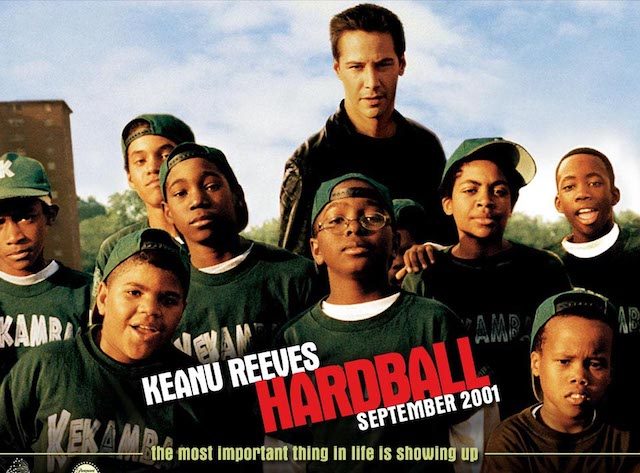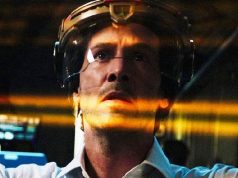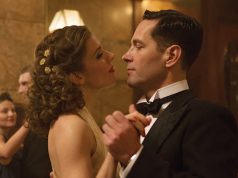
Trivia! Hardball, a PG-13 drama starring Keanu Reeves as the reluctant coach of an inner-city youth baseball team, was released in what might be the worst slot in movie history: the first weekend after 9/11. It was joined by the Leelee Sobieski thriller The Glass House. (Curiously, Diane Lane was in both movies.) There was supposed to be a third wide release, Big Trouble, but it was postponed because it had a scene involving an airplane hijacking.
(Tangent! I attended a press screening of Big Trouble on Monday, Sept. 10, 2001. At some point the next day, in the midst of all the turmoil and tragedy, it randomly occurred to me that the film would probably be shelved.)
(Second tangent! I should probably do Big Trouble for this column. When it finally did come out, in April 2002, I gave it an A-. That can’t be right, can it?)
Back to my point! Regardless of when it was released (I actually saw it before 9/11, so that didn’t have any bearing on it), Hardball was terrible. It was lousy anyway, and then a last-act melodramatic tearjerker twist made it worse. Or at least that’s how I felt at the time. Might a second lap around the bases change my mind?
What I said then:
“Some movies are good enough up to the point that they do something dreadful and manipulative to yank tears from the audience. Hardball pulls that kind of stunt but is at a disadvantage: It was a bad movie already…. Keanu Reeves, without emotion as always, is a Chicago ticket-scalper named Conor … [whose] businessman friend pays him to coach an inner-city youth baseball team that his company sponsors…. What happens from there could not be more predictable if Miss Cleo herself foretold it. What’s odd is that it’s told in a sort of movie shorthand…. There is no cause and effect. The kids start liking Conor, but not because of anything he does. They improve at baseball, but no reason is given for that. Conor becomes less selfish, but there’s no indication it stems from his interaction with the boys. The movie knows it has to arrive at these points … but has no clue what roads to take. So it just leaps ahead to them, like a truly horrible rough draft of a mediocre student-written movie script…. Keanu’s woodenness makes him completely uninteresting as a character, and everything going on is humorless, treacly and absolutely uncompelling…. By the end … I had become considerably less charitable.” Grade: F [Read the whole review.]
I was in good company, with 62% of the reviews at Rotten Tomatoes being classified as Rotten. Plenty of them were just as harsh, too, with lots of D’s and F’s and 1 stars and so forth. At the other end of the spectrum, among the 38% of critics who reviewed it favorably, I can’t find any who loved it. Poor Keanu: occasionally tolerated, sometimes praised, seldom loved.
The re-viewing:
As usual, I hadn’t re-read my old review before I re-watched the film. I wondered if it was possible that the movie was so-so (rather than bad) and that my disdain for the ending had retroactively ruined the whole thing. (The TV series The Killing got that treatment from a lot of viewers, who’d liked it for 13 episodes but suddenly hated it — all of it, from start to finish — when they didn’t like the way season 1 ended.)
This hypothesis proved incorrect, however. First thing that happens is Keanu drinking booze out of a paper bag while stumbling up the steps of a church in the rain — I think there are three cliches right there — and when the priest asks if he’s praying for forgiveness or redemption, he says he’s praying that the Bulls cover the point spread. Har har! He is praying in a church because he is a gambler! That is totally a thing that people do.
Everything that happens after that is just as aggressively generic. Keanu’s stock-broker friend (why does he have a stock-broker friend?) has slicked-back Wall Street hair. There only seems to be one other team in the baseball league, and its coach is a humorless, winning-is-everything jerk. The pitcher on Keanu’s team can only perform well when he listens to a Notorious B.I.G. song on a loop on his Walkman — idiosyncrasy! — and so when the rules say that’s not allowed, Keanu and the other players sing the song for him, joined by all the parents in the bleachers.
At first Keanu’s kids all trash-talk one another during practice and show no team spirit at all. Then Keanu basically says, “Knock it off!” and immediately — I mean immediately — they are supportive and friendly, helping a teammate feel better when he botches a play. The movie doesn’t travel from Point A to Point B. It teleports.
Oh, I have two Guess Who’s In This Movie® celebrities to report: John Hawkes (Winter’s Bone, Deadwood) as Keanu’s fellow gambler, and Michael B. Jordan (Wallace on The Wire, Vince Howard on Friday Night Lights) as a baseball player.
Now let’s address the ending. (Major spoilers ahead.) After the usual heartwarming business of Keanu learning to care about these kids and the kids having a positive role model in their lives, the movie decides it needs one more sledgehammer upside the head to really drive the message home. So one of the boys — the youngest and most adorable — gets caught in the crossfire of a gang shooting and dies.
This ending is still manipulative and unnecessary, but it’s not quite as appalling on second viewing, when I’m not being blindsided by it. Taken with the rest of the bullpoop being shoveled out by the movie, it barely feels any more desperate than the rest of it. Looking back, my reaction definitely had an “ugh, that’s the last straw” component.
Do I still hate this movie?
Yeah, but now I hate it in a much more balanced way. In 2001 it was: This is a bad movie with an even worse ending. Now it’s: This is an awful movie that ends as awfully as an awful movie like this ought to end.. That being said, the ways in which it is awful are not unusual. The maudlin finale is pointless, but it’s not offensive (or even unique). I shall henceforth think of it not as an especially rancid crapfest but merely as an ordinary and forgettable one. Grade: D
— Film.com




